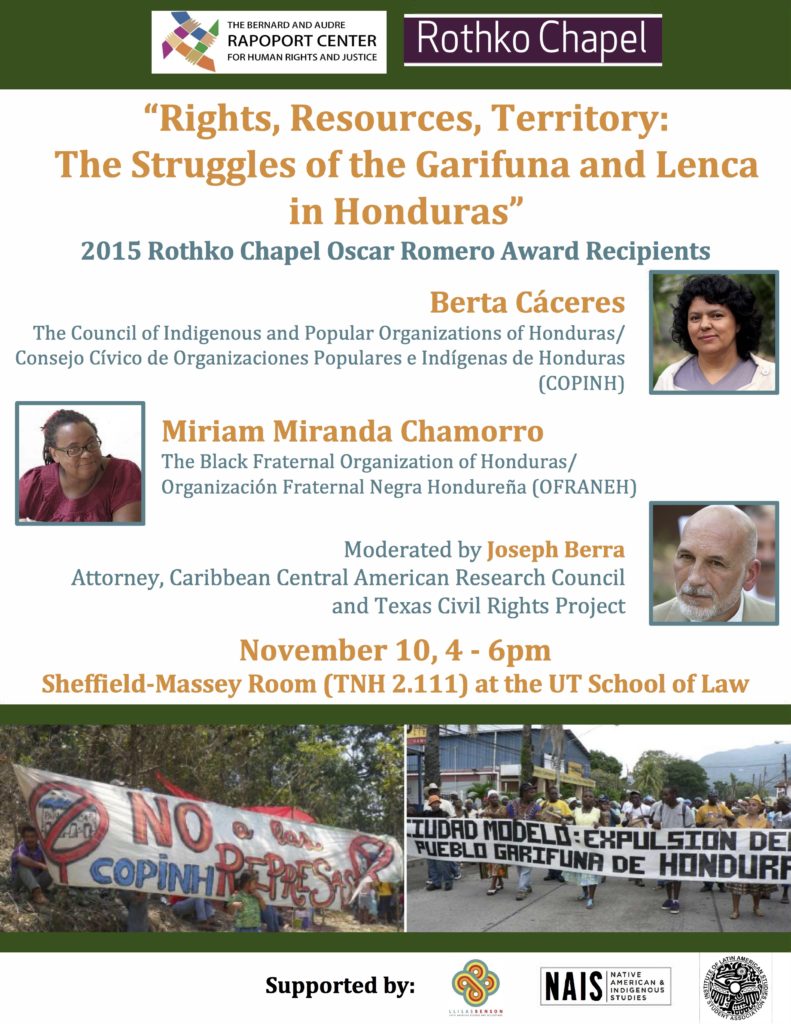
Rights, Resources, Territory: The Struggles of the Garifuna and Lenca in Honduras
- Berta Cáceres Coordinator, Council of Indigenous and Popular Organizations of Honduras (COPINH)
- Miriam Miranda Chamorro Executive Director, The Black Fraternal Organization of Honduras (OFRANEH)
Social justice advocates around the world were shocked and outraged to learn of the assassination of Berta Cáceres on March 3, 2016. Cáceres was an indigenous Honduran activist who had led her Lenca community in protests against the building of a series of dams affecting Lenca territory. Because of this work and her broader struggle for justice and equality in Honduras, she had received numerous threats to her life. Nevertheless, she continued to speak out.
We, at the Rapoport Center, were particularly struck by this news because we had been privileged to meet and engage with Cáceres when, in November 2015, she came to speak about her work as coordinator of the Council of Indigenous and Popular Organizations of Honduras (COPINH). She spoke alongside Miriam Miranda Chamorro, a Garífuna activist and executive director of the Black Fraternal Organization of Honduras (OFRANEH). Both women have fought for years, individually and together, to protect the rights of indigenous populations in Honduras.
The public forum, entitled “Rights, Resources, Territory: The Struggles of the Garífuna and Lenca in Honduras,” was co-sponsored by the Rothko Chapel in Houston, which presented Cáceres and Miranda with the 2015 Óscar Romero Award*. The event was also supported by LLILAS Benson, Native American and Indigenous Studies, and the Institute of Latin American Studies Student Association.
“We have been facing a policy of extermination,” Cáceres said in speaking about Lenca struggles. “We are facing the worst threat in the last 500 years. There is a plan…to make us disappear as an indigenous people, and for us, that amounts to genocide.”
Miranda discussed threats to Garífuna land by transnational corporate resource exploitation, state infrastructure projects, tourism developments, and drug trafficking. She detailed repressive Honduran state policies and highlighted the responsibility wealthy countries have to curb their demand for raw materials.
During the forum, both activists spoke of the intense persecution they faced, but reiterated the need to take action. Miranda said, “We all need to take responsibility wherever we are to generate change, to strengthen the commonality and the collectivity.”
In response to Cáceres’ assassination, the Rapoport Center wrote letters to the government of Honduras condemning the act and calling for a comprehensive investigation of her murder, the protection of indigenous lands, and attention to underlying issues of dispossession in the country. Given that over 100 environmental defenders have been killed in Honduras since 2010, we also called for immediate steps to guarantee the rights and safety of activists.
As one small gesture to further her legacy, the Rapoport Center will award the Berta Cáceres Human Rights Fellowship to support a summer internship for a law student. We hope to impress upon the recipients of that award, as well as remember in the work we do, words offered by Berta on another occasion: “Wake up! Wake up humanity! There’s no more time. Our consciences are shaken by the mere thought of self-destruction by capitalist, racist, and patriarchal depredation.”
*The biennial Óscar Romero Award recognizes courageous, grassroots, human rights advocacy. The award is named after Archbishop Óscar Romero of San Salvador, who was beatified in May of this year. More info at http://www.oscarromeroaward.org/.
Respondents
- Joseph Berra Attorney, Texas Civil Rights Project
Supporters
The event is co-sponsored by LLILAS Benson, Native American and Indigenous Studies, and the Institute of Latin American Studies Student Association.

